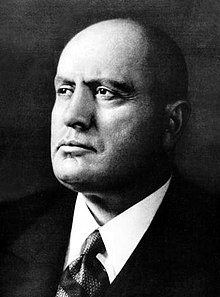

Prime Minister of Italy
Benito Amilcare Andrea Mussolini 29 July 1883 Predappio, Kingdom of Italy
28 April 1945(1945-04-28) (61) Giulino di Mezzegra, Kingdom of Italy
31 October 1922 – 25 July 1943
"Mussolini" redirects here. For other people named Mussolini, see Mussolini family. Italian dictator and founder of fascism (1883–1945) This article is part of a series about Benito Mussolini Political views Duce of Fascism Fascist Manifesto Italian Fascism Spazio vitale Economic policies Racist policies Fascist Propaganda Model of masculinity Parties Italian Socialist Party (1901–1914) Fasces of Revolutionary Action (1915–1919) Italian Fasces of Combat (1919–1921) National Fascist Party (1921–1943) Republican Fascist Party (1943–1945) Elections 1924 1929 1934 Historical events Red Biennium March on Rome Mussolini Cabinet Italy under Fascism Corfu incident Murder of Giacomo Matteotti Aventine Secession Battle for Grain Battle for Land Battle for the Lira Battle for Births Pacification of Libya Abyssinia Crisis Second Italo-Ethiopian War Foundation of the Empire Spanish Civil War Munich Agreement Invasion of Albania Rome-Berlin Axis Pact of Steel World War II Fall of the regime Italian Social Republic Italian Civil War Government of the RSI Death of Mussolini vte Benito Amilcare Andrea Mussolini (Italian: ; 29 July 1883 – 28 April 1945) was an Italian politician and journalist who founded and led the National Fascist Party. He was Prime Minister of Italy from the March on Rome in 1922 until his deposition in 1943, and "Duce" of Italian Fascism from the establishment of the Italian Fasces of Combat in 1919 until his execution in 1945 by Italian partisans. As dictator of Italy and founder of fascism, Mussolini inspired and supported the international spread of fascist movements during the inter-war period. Mussolini was originally a socialist politician and a journalist at the Avanti! newspaper. In 1912, he became a member of the National Directorate of the Italian Socialist Party (PSI), but he was expelled from the PSI for advocating military intervention in World War I, in opposition to the party's stance on neutrality. In 1914, Mussolini founded a new journal, Il Popolo d'Italia, and served in the Royal Italian Army during the war until he was wounded and discharged in 1917. Mussolini denounced the PSI, his views now centering on Italian nationalism instead of socialism, and later founded the fascist movement which came to oppose egalitarianism and class conflict, instead advocating "revolutionary nationalism" transcending class lines. On 31 October 1922, following the March on Rome (28–30 October), Mussolini was appointed prime minister by King Victor Emmanuel III, becoming the youngest individual to hold the office up to that time. After removing all political opposition through his secret police and outlawing labor strikes, Mussolini and his followers consolidated power through a series of laws that transformed the nation into a one-party dictatorship. Within five years, Mussolini had established dictatorial authority by both legal and illegal means and aspired to create a totalitarian state. In 1929, Mussolini signed the Lateran Treaty with the Holy See to establish Vatican City. Mussolini's foreign policy aimed to restore the ancient glory of the Roman Empire by expanding Italian colonial possessions and the fascist sphere of influence. In the 1920s, he ordered the Pacification of Libya, instructed the bombing of Corfu over an incident with Greece, established a protectorate over Albania, and incorporated the city of Fiume into the Italian state via agreements with Yugoslavia. In 1936, Ethiopia was conquered following the Second Italo–Ethiopian War and merged into Italian East Africa (AOI) with Eritrea and Somalia. In 1939, Italian forces annexed Albania. Between 1936 and 1939, Mussolini ordered the successful Italian military intervention in Spain in favor of Francisco Franco during the Spanish civil war. Mussolini's Italy initially tried to avoid the outbreak of a second global war, sending troops at the Brenner Pass to delay Anschluss and taking part in the Stresa front, the Lytton Report, the Treaty of Lausanne, the Four-Power Pact and the Munich Agreement. However, Italy then alienated itself from Britain and France by aligning with Germany and Japan. Germany invaded Poland on 1 September 1939, resulting in declarations of war by France and the UK and the start of World War II. On 10 June 1940, Mussolini decided to enter the war on the Axis side. Despite initial success, the subsequent Axis collapse on multiple fronts and eventual Allied invasion of Sicily made Mussolini lose the support of the population and members of the Fascist Party. As a consequence, early on 25 July 1943, the Grand Council of Fascism passed a motion of no confidence in Mussolini; later that day King Victor Emmanuel III dismissed him as head of government and had him placed in custody, appointing Pietro Badoglio to succeed him as Prime Minister. After the king agreed to an armistice with the Allies, on 12 September 1943 Mussolini was rescued from captivity in the Gran Sasso raid by German paratroopers and Waffen-SS commandos led by Major Otto-Harald Mors. Hitler, after meeting with the rescued former dictator, then put Mussolini in charge of a puppet regime in northern Italy, the Italian Social Republic (Italian: Repubblica Sociale Italiana, RSI), informally known as the Salò Republic, causing a civil war. In late April 1945, in the wake of near total defeat, Mussolini and his mistress Clara Petacci attempted to flee to Switzerland, but both were captured by Italian communist partisans and summarily executed by firing squad on 28 April 1945 near Lake Como. The bodies of Mussolini and his mistress were then taken to Milan, where they were hung upside down at a service station to publicly confirm their demise.

We use cookies
We use cookies and other tracking technologies to improve your browsing experience on our website, to show you personalized content and targeted ads, to analyze our website traffic, and to understand where our visitors are coming from. Privacy Policy.